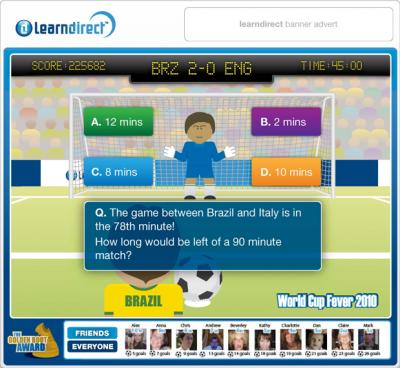As the World Cup draws to a close, Kirstie Donnelly looks at how it can be used to get more adults interested in learning, particularly online.
Turning a passion for sport into a passion for learning
Using sport as a way to help boost skills is nothing new. You just need to look at the F1 in Schools challenge which has seen pupils compete to design and manufacture a miniature racing car since 2001. The challenge uses interest in Formula One to create an exciting learning environment for young people to change perceptions of engineering, science and technology.
 "The key is to know the target audience, find a sport they relate to and never try to shoehorn the link to learning. Make it fun but above all, make it relevant."
"The key is to know the target audience, find a sport they relate to and never try to shoehorn the link to learning. Make it fun but above all, make it relevant."Using football matches to reach learners has also been employed by the former Learning and Skills Council in its Get On skills campaign. The Footie Chants element of the campaign encouraged adults to write new football chants for the England football squad, highlighting their ability to use words in day-to-day situations.
The competition, judged by John Barnes and Barnsley Football Club’s poet-in-residence Ian McMillan, inspired them to improve their English skills and gain a qualification.
In total the campaign generated 380,000 calls from adults wanting to improve their skills. Clearly this approach works. It generates interest, creates a talking point and delivers real changes amongst those who take part.
Although Football Fever and Footie Chants are aimed at improving basic skills, using sport to engage and motivate learners opens up a range of possibilities for trainers and human resource professionals.
Linking learning with social media
At learndirect we have also been using sport as a way to encourage people to improve their skills. As we all know, the number of adults struggling with maths continues to be a national problem – and we have a goal to help improve the nation’s maths skills.
We decided the perfect way to motivate people was to combine a national passion – Facebook, with a subject close to our target audience’s heart – football. We developed Football Fever 2010, a fun way for players to test their football knowledge and, at the same time, maths skills in a virtual World Cup setting.
When developing the game it was important the questions tested both maths ability and football knowledge. For example: “A full time game is played with an added six minutes in the first half and three minutes in the second halk. How long was the game played in minutes?"
Questions are linked to the maths curriculum and encourage learning in the areas of addition, subtraction, multiplication and division, percentages, measurements, fractions and decimals. For every question answered correctly players can take a shot at goal, if they get it wrong they are given the correct answer and the reasoning behind it.
Crucially the Facebook-based game helps users gauge their maths skills in a fun way, and in an environment they are comfortable in. For players who want to know more, we help them to choose the right path to improve their maths and employability skills with qualifications relevant to them. Since launch, the game has been played more than 700 times, with between 140 to 160 games started each week.
As the World Cup draws to a close, Kirstie Donnelly looks at how it can be used to get more adults interested in learning, particularly online.
Turning a passion for sport into a passion for learning
Using sport as a way to help boost skills is nothing new. You just need to look at the F1 in Schools challenge which has seen pupils compete to design and manufacture a miniature racing car since 2001. The challenge uses interest in Formula One to create an exciting learning environment for young people to change perceptions of engineering, science and technology.
 "The key is to know the target audience, find a sport they relate to and never try to shoehorn the link to learning. Make it fun but above all, make it relevant."
"The key is to know the target audience, find a sport they relate to and never try to shoehorn the link to learning. Make it fun but above all, make it relevant."The competition, judged by John Barnes and Barnsley Football Club's poet-in-residence Ian McMillan, inspired them to improve their English skills and gain a qualification.
In total the campaign generated 380,000 calls from adults wanting to improve their skills. Clearly this approach works. It generates interest, creates a talking point and delivers real changes amongst those who take part.
Although Football Fever and Footie Chants are aimed at improving basic skills, using sport to engage and motivate learners opens up a range of possibilities for trainers and human resource professionals.
Linking learning with social media
At learndirect we have also been using sport as a way to encourage people to improve their skills. As we all know, the number of adults struggling with maths continues to be a national problem – and we have a goal to help improve the nation’s maths skills.
We decided the perfect way to motivate people was to combine a national passion - Facebook, with a subject close to our target audience’s heart – football. We developed Football Fever 2010, a fun way for players to test their football knowledge and, at the same time, maths skills in a virtual World Cup setting.
When developing the game it was important the questions tested both maths ability and football knowledge. For example: “A full time game is played with an added six minutes in the first half and three minutes in the second halk. How long was the game played in minutes?"
Crucially the Facebook-based game helps users gauge their maths skills in a fun way, and in an environment they are comfortable in. For players who want to know more, we help them to choose the right path to improve their maths and employability skills with qualifications relevant to them. Since launch, the game has been played more than 700 times, with between 140 to 160 games started each week.








